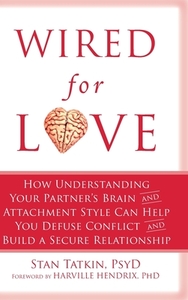Take a photo of a barcode or cover
challenging
informative
inspiring
medium-paced
A bit dated, this book has genuinely good insight to support and improve a relationship. It is not appropriate for anyone experiencing intimate partner abuse.
I read this one with my partner and it totally shifted the way I think about the role of an individual in a relationship. I saw both myself and my partner in the author's examples, and loved the exercises that encourage each person to examine their own patterns and choose behaviors that actually serve their goals of creating safety, intimacy and closeness.
hopeful
informative
slow-paced
This book has some very helpful advice and activities that helped me find more productive ways to respond to my spouse. This book also helped me change my perspective from worrying about “my” happiness to focusing on the health of “our” relationship.
My biggest concern with this book is that I felt it lead you to put too much responsibility on managing each other’s emotions. I struggle with depression and I would hate for my husband to believe that he was responsible for making me happy when that’s something that is even out of my control sometimes.
My biggest concern with this book is that I felt it lead you to put too much responsibility on managing each other’s emotions. I struggle with depression and I would hate for my husband to believe that he was responsible for making me happy when that’s something that is even out of my control sometimes.
informative
reflective
slow-paced
informative
medium-paced
• 𝑩𝒐𝒐𝒌 𝑹𝒆𝒗𝒊𝒆𝒘 •
𝗥𝗮𝘁𝗶𝗻𝗴: ☆☆☆ 3.5/5
Very practical book with tips and tricks for your relationship. Even when not in a relationship at the moment, I found the information and examples given very useful.
A lot of my reviews are also available with photo at my Bookstagram: @justmyfantasyworld
𝗥𝗮𝘁𝗶𝗻𝗴: ☆☆☆ 3.5/5
Very practical book with tips and tricks for your relationship. Even when not in a relationship at the moment, I found the information and examples given very useful.
A lot of my reviews are also available with photo at my Bookstagram: @justmyfantasyworld
I found the discussion on attachment styles valuable, but the author’s perspective is very cis heteronormative and as the book continued I found it grating. He lost me entirely when he started talking about how your romantic partner is responsible for being your anti-depressant and anxiety cure “no copay required!”… big yikes. Take your meds y’all!
I want to give it between 2&3. It provides interesting reframing of the way we talk about attachment styles from secure, anxious and avoidant to anchors, islands and waves. Providing new ways of showing it without really anything new.
I appreciate the use, though subtle of gay relationships within. The book does provide useful tools but tends to be overly simplistic in approach and I think could use an update on how the approach would work on polyamorous relationships.
There are stronger books out there like Hold Me Tight that are really transformative in how you think about relationship patterns and navigating them.
I appreciate the use, though subtle of gay relationships within. The book does provide useful tools but tends to be overly simplistic in approach and I think could use an update on how the approach would work on polyamorous relationships.
There are stronger books out there like Hold Me Tight that are really transformative in how you think about relationship patterns and navigating them.
it has taken me a lot of attachment reading to start to understand attachment and how it can be more than an assessment of parenting or an explaination for unhelpful behaviours.
I did like the renaming of the styles to anchor, island and wave and the focus on brain function and recognizing it rather than changing or feeling guilty for our style. I did feel that like many attachment theories even in parenting it has a very one-on-one, two person relationship style that I feel excludes many other ways of being. I do like idea of a relationship bubble - but can we create this place of safety and commitment without making the relationship the only place for security and it being an us against the world mentality. I find many attachment theories are missing the idea of the village - both in parenting and relationships - it is the idea of the one place of safety and security - what if there is more than one that does not compete or negate the other.
I did like the renaming of the styles to anchor, island and wave and the focus on brain function and recognizing it rather than changing or feeling guilty for our style. I did feel that like many attachment theories even in parenting it has a very one-on-one, two person relationship style that I feel excludes many other ways of being. I do like idea of a relationship bubble - but can we create this place of safety and commitment without making the relationship the only place for security and it being an us against the world mentality. I find many attachment theories are missing the idea of the village - both in parenting and relationships - it is the idea of the one place of safety and security - what if there is more than one that does not compete or negate the other.




